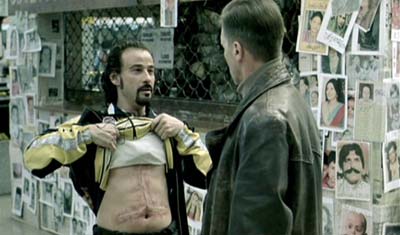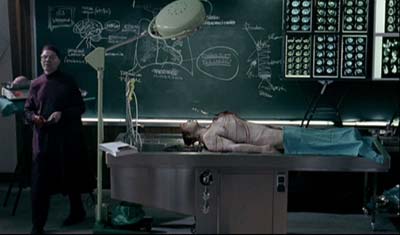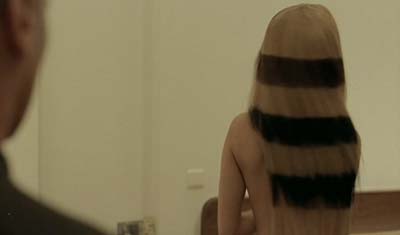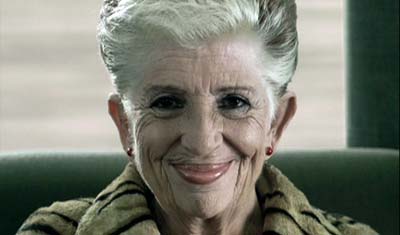Fausto 5.0
Off-kilter Spanish Faust reworking, compelling in a bizarre sort of way.

Dr. Fausto (Miguel Angel Sola) seems quite in control of his life, even if it's a little bleak. He works in a research centre dealing with terminally ill patients. Once medicine runs out of options, they are sent to Fausto to try whatever experimental routines he thinks may save them. His success rate is not great, unsurprisingly, but nonetheless the work he and his assistant Julia (Najwa Nimri) is important. As such, he is called to Barcelona to give a speech to a conference on terminal diseases.
From the outset it's clear that this isn't going to be shot in a conventional way. Being set in an undefined future time gives the directors (Isidro Ortiz, Alex Olle and Carlos Padrissa, quite a few cooks but their experience on the previous stage shows Fausto 3.0 ensures a minimum of broth-spoilage) license to play with convention a little. Hence we can have striking and slightly surreal images of workmen hosing down a high-speed train through the good ol' bleach bypass filters so beloved of Minority Report, which almost seems to suggest a disinfectant routine. The medical facility and even the hotel Fausto stays at in Barcelona are shot in stark, stark white. More worryingly, the opening scenes feature a fair amount of film trickery of overlaying abstract, static images over the admittedly pointless background footage. This had me worried that I'd be treated to a nightmarish film-studenty disjointed experimental piece of garbage but thankfully this is quickly reined in, and just seems to be for effect over the opening credits.
Fausto travels off on the train, as is as weirded out as I am by an incredibly strange looking old woman who can't stop staring at him. The distraction of a crippled woman being helped into a seat (entirely pointless and never mentioned again, but an interesting visual) doesn't stop her creepy stare, so Fausto asks if he knows her. The conversation doesn't prove too enlightening, and quickly ends as she leaves to go to the toilet, entrusting Fausto with her garish case. He's still holding it once the train pulls up in the station, and there's no sign of the old hag.

While trying to convince the guards to search for her, he's distracted by one of his old patients, Santos Vella (Eduard Fernandez). Fausto had removed Santos' entire stomach as a desperation move some year previous and given him 3 months to live, which we'll assume was an improvement to the situation rather than an elaborate practical joke. Fausto initially disbelieves the cloying Santos and tries to get rid of him, accepting Santos' business card and promising to call if he needs him.
Fate plays another of its patented tricks when Fausto's taxi breaks down, and Santos just happens to be there to pick him up. It's well played on both actors' parts, Fausto's irritation growing as exponentially with Santos' irritating habit of treating the good doctor as if they've known each other forever. Santos promises to look after the unopened old ladies case for him, and get it back to the station and convince the guards to actually try and reunite it with its owner. As with the original Faust stories, symbolism runs rife, and there's probably a reasonable argument to say it's his soul that Fausto is handing over here. Certainly this is where Santos stars making it clear that he's out to make Fausto happy and give him whatever he wants.
Santos takes Fausto on a trip around Barcelona's various dives and activities, including a fantastic scene of them returning to Santos' house. Santos finally manages to convince a reluctant Fausto to cut loose and live a little. Rock music blares from the sound system, they enjoy a drink or two, Santos introduces Fausto to the pleasures of smashing expensive things with golf clubs. Santos gives Fausto a suit to try on, only the doctor to return to a bemused family wondering exactly what he's doing smashing their stuff up. Heading out to find Santos having a right old chuckle at his expense, the expected rage never materialises. Instead he too crumples with laughter at the absurdity of it, and the fact that the check he's just written to cover the damage will bounce as high as a hippy at Woodstock. It's superbly played by the leads, and watching their relationship develop from openly antagonistic on Fausto's part to amiable and to utter desperation as the film reaches its climax.

As Fausto discovers more of the bizarre side of Barcelona, including a party in a disused, about to be demolished hospital, Fausto begins to suspect something is wholly unnatural about Santos, and his genie-like ability to make wishes come true. This starts off seeming to be a positive thing, as one of his patients makes a sudden and inexplicable recovery. Things take a more disturbing twist after Fausto is humiliated at the conference, after one of his video aids is replaced with a porn flick. Suspecting some of the doctors who have previously disparaged his work, he wishes one of them dead.
Fausto breaks down totally on returning to his hotel and finding the other doctor being wheeled out. His room is wrecked, and covered in incriminating graffiti apparently written in excrement. His desperate search for Santos through the city streets isn't helped by seeing ex-patients who should by all rights be dead wandering around, further damaging his mental state. He's concerned that he wished someone would take care of Julia, and it appears Santos is taking the task on himself. The dynamic between the two characters is so convincing that the menace that Fernandez imbues Santos with is believable, despite his goofish behaviour earlier.
Like the Faust legends, this boils down to a fairly obvious little morality tale in the final analysis, with Julia representing Fausto's good intentions, positive aspects and reasoning; Santos embodying the darker, impulsive side of his soul. The balance between the two is delicate, and the sudden influx of power seems to tip Fausto over the edge. Another well-documented case of power corrupting, and showing that a world where all our desires are met may not be the best way to live.

It's a strangely compelling tale, although it has a great many entirely abstract images and moments of the surreal and bizarre which some may find to distract from the thrust of the story, especially as they have little to do with the plot. For example, the hotel Fausto stays in is draped in a sort of plastic sheeting, but the reasons for this are never even alluded to. An arresting but inexplicable visual, like a few other scenes here. I doubt they are present in quite the numbers required to completely disgust anyone not so enamoured of this trickery, but I must admit I liked it.
Perhaps it swings a little too much towards the art-house level style over substance that is a sure thing to pick up awards (as this has) and also to be ignored by the public (a limited release over here, but very popular in it's native Spain I'm told). Dammit, I don't care. It's a fairly spellbinding tale, although I think that its flaws may become all too apparent on repeat viewing. That doesn't detract from the fact that I found this a supremely interesting and entertaining way to while away a couple of hours at the cinema.
Were I in the business of passing quantifiable judgements, I'd award this 4/5 TippyMarks.
Alex Olle
Carlos Padrissa
Eduard Fernandez (Santos)
Najwa Nimri (Julia)